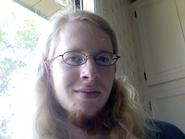
In the 2006 midterm elections, the Democrats gained a majority in the both the House of Representatives and the Senate. Kye Lippold '10 (South Burlington, Vt.) noted a similarity to the 1994 "Republican Revolution" when the Republican Party gained control of both legislative bodies. This summer Lippold is working with the James S. Sherman Associate Professor of Government Philip Klinkner to investigate broader trends in the U.S. electorate and whether the 2006 election results are the signs of a larger movement in the country's political character.
Lippold came to his project hoping to compare the elections in 2006 to those in 1994. During his preliminary research, however, he decided to focus more on the important issues of the 2006 election, such as the increase of partisan politics. According to studies, the American people have been growing closer together in the last thirty years on every topic except party politics.
Lippold's research involves statistical analysis on the American National Election Studies (ANES), a large-scale survey of American voters that is released by the University of Michigan. The study uses pre-election and post-election interviews to asses both the structure of the American electorate and American public opinion; precisely the data Lippold needs for his research. He has been running tests on the ANES pilot for 2006 (the full survey has not yet been released) including, most recently, regression trends to determine factors which make voters stronger members of their party.
An early regression indicates, for instance, that factors that make people stronger Democrats include approval of the president, an interest in public affairs, being a member of the North/Central region, and attending church regularly. "The last one was unexpected," Lippold said. Factors that influence Republican partisanship include education, income, presidential approval and religion. Lippold explained that these were "interesting results," but hastened to add that the data came from a pilot survey and that this was a very initial conclusion.
Lippold in part was lured to this project by the upcoming presidential election. While he has yet to prove that partisan politics are largely on the rise in the U.S., Lippold used his present evidence to predict another tightly contested election. As he explained, some recent studies suggest that numbers of Republicans are shifting to vote Independent, and if they do so for the election, the Democrats will have a clear lead.
Lippold was also attracted to the electorate research because of the statistics skills he would be required to learn. As a potential public policy major, Lippold was interested in familiarizing himself with current statistics software, which he has certainly done during his work this summer. "I'm learning things on the fly," he said, and added that he had gained a great deal of skill with both the subject and the software.
A rising sophomore, Lippold is enjoying this summer and planning another proposal for the next one, possibly a project on cognitive dissonance in the electorate, a topic which appeals to his interests in political science and psychology. During the year, Lippold is a member of Capoeira Club and the debate team and active as a volunteer. He is considering a degree in public policy with a career in government or an internationally-based NGO.
Lippold's research this summer is funded by the Emerson Foundation Grant Program, which provides students with significant opportunities to work collaboratively with faculty mentors, researching an area of mutual interest. Recipients typically undertake some combination of fieldwork, laboratory investigation, library research and the development of teaching materials. A public presentation of their findings is required of all Emerson Scholars during the academic year.
-- by Lisbeth Redfield
Posted August 10, 2007
